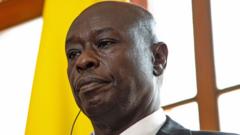In a shocking turn of events in Kenya's political landscape, Deputy President Rigathi Gachagua was removed from office by the Senate while he was hospitalized. The dramatic proceedings saw Gachagua, who was elected alongside President William Ruto just over two years ago, fail to appear at his impeachment trial due to alleged health issues.
Gachagua's lawyer informed the Senate that the deputy president was suffering from chest pains and receiving treatment at The Karen Hospital, prompting a request for a delay in the trial. However, the determination of the senators to proceed without him led to a significant turning point as they continued without Gachagua's defense, ultimately resulting in his impeachment. His defense team subsequently vacated the chamber in protest.
Last week, the National Assembly had also voted overwhelmingly in favor of removing Gachagua, leading to a hasty Senate trial characterized by significant political tension. Gachagua, a wealthy businessman from the influential Mount Kenya region, labeled the impeachment proceedings as a "political lynching" amidst growing rifts with Ruto.
In a decisive vote on Thursday evening, two-thirds of the 67 senators supported his removal on multiple charges, including allegations of corruption and inciting ethnic divisions. This major political shift reinforces President Ruto's influence, especially following a period of intra-government conflict, notably when Gachagua publicly criticized the president's handling of unrest related to unpopular taxation.
Despite the turmoil, President Ruto has remained silent on the issue. As Gachagua's legal team decried the accusations during the trial, he signaled intentions to challenge the Senate's verdict pending results from his health recovery. Meanwhile, discussions surrounding potential successors for the deputy president are already stirring, with notable figures like Murang'a County Governor Irungu Kang'ata and Kirinyaga County Governor Anne Waiguru emerging as potential candidates.
This political shakeup has ignited discussions across various platforms, reflecting deep-seated issues in governance as Kenya navigates its tumultuous political landscape.





















